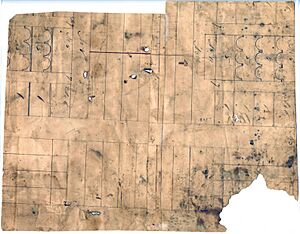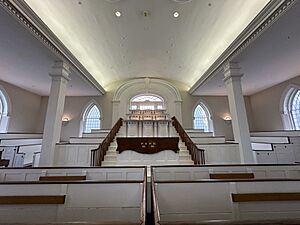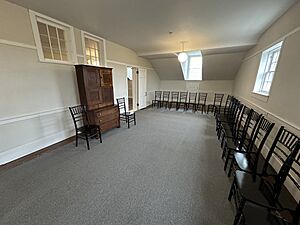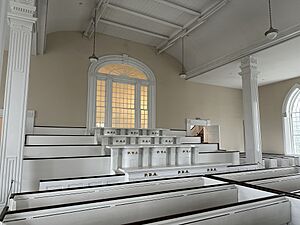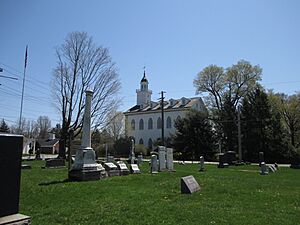Kirtland Temple facts for kids
| Kirtland Temple | |||||||||||||||||||||||
|---|---|---|---|---|---|---|---|---|---|---|---|---|---|---|---|---|---|---|---|---|---|---|---|
Quick facts for kids Historical site |
|||||||||||||||||||||||
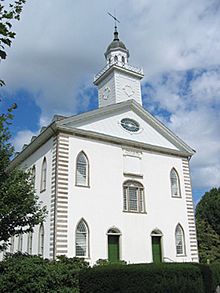 |
|||||||||||||||||||||||
| edit data | |||||||||||||||||||||||
| Dedicated | March 27, 1836 by Joseph Smith |
||||||||||||||||||||||
| Floor area | 15,000 sq ft (1,400 m2) | ||||||||||||||||||||||
| Followed by | Nauvoo Temple | ||||||||||||||||||||||
| Official website: http://www.kirtlandtemple.org/• News & images | |||||||||||||||||||||||
|
|||||||||||||||||||||||
|
Kirtland Temple
|
|
| Location | Kirtland, Ohio |
|---|---|
| Built | 1833 |
| Architect | Smith, Joseph; Et al. |
| Architectural style | Gothic, Federal |
| NRHP reference No. | 69000145 |
| Added to NRHP | June 4, 1969 |
The Kirtland Temple is a very important building for members of the Latter Day Saint movement. It was the first temple they ever built. This special building is located in Kirtland, Ohio. It was officially opened in March 1836.
Joseph Smith, who started the movement, guided the building of the temple. He said he received special messages, called revelations, that told him how to build it. The temple mixes different building styles. These include Federal, Greek Revival, and Gothic Revival styles.
The Kirtland Temple was added to the National Register of Historic Places in 1969. It was named a National Historic Landmark in 1977. For a long time, the Community of Christ church owned and took care of the temple. But on March 5, 2024, ownership changed. Now, the Church of Jesus Christ of Latter-day Saints (LDS Church) owns it.
Building the Kirtland Temple was a huge team effort. Many church members helped out. They even built a sawmill and a special factory called an ashery. These helped provide the materials needed for construction. The temple has unique features inside. These include pews that can be moved and two sets of pulpits. This shows it was used for many things, like worship and learning. The third floor was used for classes. People studied important religious topics there.
The temple was dedicated on March 27, 1836. About one thousand people attended this special event. It included traditions like the Hosanna Shout. Church leaders also shared stories of seeing visions. They reported that ancient prophets like Moses, Elias, and Elijah appeared. These prophets were said to restore important religious authority. Not long after, Joseph Smith and Oliver Cowdery reported seeing Jesus Christ inside the temple.
Today, the Kirtland Temple is a historic site. It is open for tours and events. Many visitors come from all over the world each year. Its history, unique design, and ongoing use make it a special landmark.
Contents
Building the Temple
In December 1830, Joseph Smith said he received a message. It told church members to gather in Ohio. By 1831, many members moved to the Kirtland area. In December 1832, Smith said he received another message. This one called for a special building. It would be a place for worship, learning, and order. On December 27, 1832, he announced the temple would be built.
On May 6, 1833, Smith said God told the church to build "a house ... wholly dedicated unto the Lord." This house would be for the church's leaders. The First Presidency, which included Smith, Sidney Rigdon, and Frederick G. Williams, led the project. They held a ceremony on July 23, 1833. This is when the first cornerstone was placed. Construction started right away. At first, the building was simply called "the House of the Lord."
Visions for the Temple Design
According to a diary, the First Presidency had a shared vision. They saw what the temple should look like, both inside and out. This vision helped guide the volunteers. One director of Historic Kirtland Village said these visions were "like our (present day) virtual reality."
The instructions were to build a "lower court and a higher court." It was promised that God's "glory shall be there." The first plans called for the inside to be about 55 feet wide and 65 feet long. The building has two main gathering areas. These are an upper and a lower hall.
How the Temple Was Used
The lower hall was mostly used for worship. This included the sacrament (like communion), preaching, and prayer. It has two sets of pulpits, one at each end. The pews could be adjusted. This allowed people to face either direction. The upper hall was used for learning. It was home to the School of the Apostles.
The third floor had several uses. During the day, it held regular school classes. In the evenings, church groups met there. Church members also studied Hebrew. This study, though short, greatly influenced the church's beliefs. This floor also housed the School of the Prophets. Joseph Smith started this school in 1833. It focused on uniting members and building a strong community. The third floor also had church offices, including Joseph Smith's.
Unique Design Features
The inside of the temple had special features. The outside looked like New England Protestant churches. For example, the pulpits were unique. There were two sets of four-tiered pulpits. They were at each end of the assembly rooms. These were for the leaders of the Melchizedek and Aaronic priesthoods. The pulpits had golden letters. These letters showed the different leadership roles. For example, "M.P.C." stood for Melchizedek Presiding Council.
Church members gave their time and materials. They even ground up glass and pottery. This was mixed into the stucco for the walls. The crushed glass made the walls look shiny.
Community Effort in Construction
Building the Kirtland Temple was a true community effort. At that time, many church members were poor. Money was hard to find. Berea sandstone was cut from a quarry. Lumber came from the nearby forests. To build faster, church members built a sawmill in 1833. An ashery (a place to make lye from ash) was also used. The sawmill and ashery helped provide building materials.
The church bought 16 acres of old-growth forest. This provided wood like walnut, cedar, cherry, and white oak. These logs were floated down the Chagrin River to the sawmill. There, they were cut for the temple. The temple was meant to be the center of a new community. Almost all able-bodied men who were not on church missions worked on the temple.
Women also played a big part. Under the guidance of Emma Smith, Joseph's wife, they sewed clothes for the workers. They also made materials for the temple itself. They created carpets and curtains from white canvas. These curtains were used to divide the large first and second floors. They made smaller, private sections. Curtains were also placed above the pulpits for privacy. During the day, men built the temple. At night, they guarded it from angry groups.
Many church members were important to the construction. Artemus Millet is especially noted. He helped with the exterior walls. He was the head stonemason. He also created the mix for the stucco. He was a superintendent for part of the work.
This temple was the first of its kind for early Latter Day Saints. Its purpose was different from later temples, like the Nauvoo Temple. The Kirtland Temple was used as both a meetinghouse and a dedicated temple. At the time it was built, some practices now common in temples, like baptism for the dead or endowments, had not yet started. Baptism for the dead began in 1840.
The Kirtland Temple was not originally white. It was a bluish-gray color. The roof was likely red, and the front doors were olive green. Today, only the doors are still their original color. Other temples with similar designs were planned in Missouri. But they were never built due to conflicts. The Kirtland Temple cost about $40,000 to build. It has over 2,500 windowpanes.
Temple Dedication
The temple was dedicated in a seven-hour service on March 27, 1836. The building was completely full. Many people who wanted to attend could not fit inside. Joseph Smith told them to go to a nearby schoolhouse. The service was repeated for them a few days later.
About "one thousand persons" attended the dedication. It included special traditions like the Hosanna Shout. They also sang the hymn "The Spirit of God Like a Fire Is Burning." After a long sermon, Joseph Smith gave a dedicatory prayer. He said this prayer was given to him by revelation. Other church leaders reported speaking in tongues after the prayer.
One person who was there wrote in his journal: "When about midway during the prayer, there was a glorious sensation passed through the house [Kirtland Temple]; and we, having our heads bowed in prayer, felt a sensation very elevating to the soul. At the close of the prayer, F. G. Williams ... rose and testified that midway during the prayer an holy angel came and seated himself in the stand. When the afternoon meeting assembled, Joseph, feeling very much elated, arose the first thing and said the personage who had appeared in the morning was the Angel Peter come to accept the dedication."
On Easter Sunday, April 3, 1836, Joseph Smith and Oliver Cowdery reported a very important event. They said the Lord appeared to them in the Kirtland Temple. He accepted the temple. They also reported that ancient prophets like Moses, Elias, and Elijah appeared. These prophets were said to restore different parts of religious authority. This included the gathering of Israel, the gospel of Abraham, and sealing powers.
One main reason for building the temple was to follow a commandment. It was also to receive special spiritual power. To get this power, the men needed to finish the temple. They also needed to prepare themselves spiritually, mentally, and physically. Part of this preparation involved special washings and anointings. These symbolized making their hearts pure. This would help them connect with heaven.
It is important to know that some special ceremonies happened in the Kirtland Temple. But these were seen as only a part of the full spiritual power. The full experience was expected to happen later.
Visions and Spiritual Experiences
On January 21, 1836, before the temple was finished, Joseph Smith wrote in his journal. He described the first of several visions he had at the temple. As he and others performed a special ritual, he saw "the celestial kingdom of God." He also saw "the blazing throne of God, whereon was seated the Father and the Son." Smith said the streets looked like they were paved with gold. He also taught that anyone who died without hearing about the restored gospel, but would have accepted it, would go to the Celestial Kingdom. Smith also reported seeing Adam, Abraham, and three family members. This experience was later published as a special revelation.
Days after the dedication, more visions were recorded. On April 3, Smith had his scribe write about a spiritual experience. Smith and Oliver Cowdery had this experience while praying in the pulpits. Smith said he and Cowdery saw Jesus Christ "standing upon the breastwork of the pulpit." According to Smith, Christ accepted the temple's dedication. He also promised blessings if they were obedient. After this vision of Christ, Smith and Cowdery reported seeing Moses, Elias, and Elijah. This account was later published as a special revelation by the LDS Church.
Changing Ownership
Joseph Smith did not stay in Kirtland for long after the temple was used. In 1837, he was involved with a bank that failed. This caused some disagreements among church members in Kirtland. A group led by Warren Parrish took control of the temple. By early 1838, Smith had to leave Ohio. He moved to Missouri with many loyal followers. After the main group of church members moved west, the temple was used by a teacher's school.
Over the years, the Kirtland Temple's ownership changed several times. Different groups within the Latter Day Saint movement had control. In 1860, a court sold the temple to help pay off some of Joseph Smith's debts. Later, Joseph Smith III and Mark Hill Forscutt bought a special deed to the temple in 1874.
In 1880, the RLDS Church (now Community of Christ) started a lawsuit. They wanted to clearly own the temple. The court said the RLDS Church was the rightful successor of the original church. Even though the case was dismissed, the RLDS Church gained ownership of the temple by 1901.
The local RLDS congregation used the building for Sunday worship until the 1950s. To help protect the old building, a new church was built across the street. The temple then received more direct care and money from the worldwide church. Until early 2024, the building was used for many worship services, classes, and special events.
Unlike the later Nauvoo Temple, the Kirtland Temple was never destroyed. The same stones from when it was first built are still there. Even though most church members left Kirtland in 1838, the temple was never completely empty. It has always been managed by a group connected to the Latter Day Saint movement. It has been a place of worship and a symbol since 1836.
The Community of Christ owned and operated the Kirtland Temple for over 140 years. On March 5, 2024, the LDS Church and Community of Christ announced a big change. The LDS Church bought the temple and other historic sites for $192.5 million. This deal included other important places and items. These included visitors' centers, historic homes, and old documents. This followed earlier transfers of property between the two churches. The LDS Church reopened the temple to the public on March 25, 2024, for free tours.
Visiting the Historic Site
The Kirtland Temple was used by the local RLDS church until the 1950s. After that, it was mainly used for guided tours and special meetings. The temple was added to the National Register of Historic Places in 1969. It was named a National Historic Landmark in 1977.
The visitors' center welcomes about 100,000 people each year. Many visitors come from all over the world. When the Community of Christ owned the temple, tour guides were often local residents. During busy summer months, college students also helped as guides. Other volunteers came to help with tours, maintenance, or gardening. Now, under the LDS Church, tours are guided by missionaries. They are part of the larger Historic Kirtland Village sites.
About 50 worship services or educational events were held at the Kirtland Temple each year. The temple hosted community services for holidays like Thanksgiving and Christmas Eve. It also held an annual hymn festival. Members of different Latter Day Saint groups could also hold their own services there by arranging it beforehand.
A Spiritual Formation and Visitors' Center opened in March 2007. Its outside design looks like the Kirtland Temple. It has classrooms, worship space, a theater, offices, and a small museum. The museum has old items related to the temple. It also has original documents from the Kirtland time period.
Outside the temple are gardens. Just north of the temple is the historic Kirtland North Cemetery. It has graves dating back to the 1820s. Beyond the cemetery is the restored home of Joseph and Emma Smith. Other sites of Historic Kirtland Village are also nearby.
Since the LDS Church bought the temple on March 5, 2024, it remains a historic building. It reopened for public tours on March 25, 2024, and there is no charge to visit.
See also
 In Spanish: Templo de Kirtland para niños
In Spanish: Templo de Kirtland para niños
 | Delilah Pierce |
 | Gordon Parks |
 | Augusta Savage |
 | Charles Ethan Porter |




